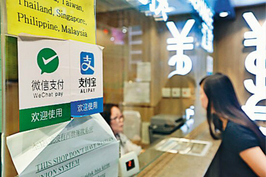Hong Kong Retail to Sell Well In Next Five Years, PwC Says

After three years of recession, PricewaterhouseCoopers (PwC) says Hong Kong’s retail industry rebounded in 2017, and the consultancy expects it will perform well over the next five years.
Given that sales increased 1.8% in the first 11 months of 2017, according to official data, PwC said the figure for the whole year will be around 3% as shopping traditionally spikes around the end of the year.
PwC expects the industry to further recover in 2018, with annual growth of 4% to 6% and at least HK$465 billion ($59 billion) in retail sales, and that it will continue grow in the next five years.
“All time high stock and real estate markets, both local and global, have created a significant wealth effect, and much improved sentiment in consumption,” said Michael Cheng, PwC Asia Pacific & Hong Kong/China Consumer Markets leader.
Cheng added that “tourist arrival numbers in Hong Kong, particularly from China, have been encouraging and recovering steadily in 2017 under the much better and stabler political and social environment.”
Other reasons include low unemployment and the recent weakening of the U.S. dollar against major currencies, Cheng said.
After hitting a record high in 2013, with sales of HK$494 billion, the retail industry in Hong Kong declined, dropping 11.7% in 2016 from three years before.
Some of the sectors hit hardest were luxury goods, such as watches and jewelry, the total sales of which dropped 13.7%, 15.6%, 17.2% in 2014, 2015 and 2016 respectively, according to Hong Kong government data. The luxury sector has recovered last year, growing 5% to HK$66.3 billion in the first 11 months of 2017.
However, Cheng pointed out that the industry is still dependent on tourism — particularly from the Chinese mainland, and that a balanced mix of global and mainland visitors would boost domestic consumption and benefit the long-term development of Hong Kong’s retail sector.
The market has worried that demand in Hong Kong might be influenced by tariffs lowered by the Chinese government in December on 187 imported consumer goods, including wine and spirits, pharmaceuticals, and food.
PwC believes this policy will strengthen domestic consumption on the mainland, but argued that it would have only a modest effect on Hong Kong retail.
Although tariffs were slashed, there is still a value-added tax of 17% in the mainland market, which still lags behind Hong Kong in terms of product diversity, authenticity and customs clearance procedures, said PwC China Tax Partner Rebecca Wong.
Contact reporter Coco Feng (renkefeng@caixin.com)

- 1China Officials Dismiss Tax Hike Rumors After Tech Selloff
- 2Cover Story: How Gutter Oil Became a Prized Fuel for International Airlines
- 3Prominent Chinese Journalist Liu Hu Detained by Police in Chengdu
- 4Maersk Unit Takes Over CK Hutchison Panama Ports After Court Ruling
- 5China Provinces Set Cautious 2026 Growth Targets
- 1Power To The People: Pintec Serves A Booming Consumer Class
- 2Largest hotel group in Europe accepts UnionPay
- 3UnionPay mobile QuickPass debuts in Hong Kong
- 4UnionPay International launches premium catering privilege U Dining Collection
- 5UnionPay International’s U Plan has covered over 1600 stores overseas






